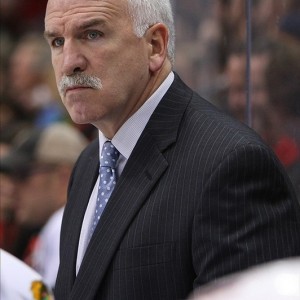Following the instant success of players like Connor McDavid, Auston Matthews and Patrik Laine in their respective rookie year, our patience with NHL newcomers seems to have gotten shorter. We expect quick results, but that’s obviously too much to ask for in most cases. As for in the case of Chicago Blackhawks rookie Gustav Forsling.
The 20-year-old defenseman out of Linköping, Sweden, wasn’t even expected to make the cut on the Hawks’ roster this season, but he did. And since then, aside from being an injured scratch for two games, he’s played in every one of Chicago’s games, at the expense of more experienced defensemen such as Michal Rozsival, Trevor van Riemsdyk, and Michal Kempny.

Considering all of this, head coach Joel Quenneville has proven he has a lot of faith in young Forsling. However, at the same time, Quenneville has been questioned for it.
But the complexity of the questioning, and why it’s difficult to say that either party is right or wrong, is that it evolves around two different mindsets when it comes to Forsling. The first one asks, what is best for the Chicago Blackhawks right now? The other one, which is the Quenneville mentality, asks, what is best for Forsling and consequently the team in the long run?
Overnight Turn
After his NHL debut at home against the St. Louis Blues, I interviewed Forsling for a Swedish local newspaper. What struck me then, and what keeps striking me every time I see him with a Blackhawks jersey on, is how quickly his career has accelerated in such a short period of time. Just a couple of months ago, he was set to begin a new season in the Swedish Hockey League, not being a star of any sort even on his Swedish team. It would be odd if the gravity of suddenly playing in the NHL didn’t affect him in any way.
On the other hand, Forsling is as calm as he looks on the ice. At least, that’s what he says out loud. “I actually wasn’t as nervous as I thought I would be”, he said to me after his debut in United Center. But not even Forsling is immune to rough patches, especially not at the age of 20-years-old.
Low Possession Numbers
Looking at all the advanced statistics available, it’s no secret that Forsling has been struggling with possession numbers on the ice during his term with the Blackhawks so far. Offensively, with only one assist in 11 games, the Swede has yet to show how productive he can be, and defensively, he has had some trouble adapting himself to the quick game. So he has caused some bad turnarounds.
Every player who has played 30+ minutes with Forsling this season has done better without him. @JayZawaski670 @NatStatTrick pic.twitter.com/rhpRPle3iT
— Satchel Price (@SatchelPrice) November 6, 2016
What’s important to recognize, however, and the reason why Forsling still is in that lineup every night, is he has arguably looked better than the numbers suggest. One of his greatest and most exciting qualities is his immeasurable calm and sensible puck movement, while sometimes crossing the line of making mistakes. That’s fine — it should be like that the first year in the NHL.
When looking at these circumstances of Forsling, does his possession numbers really matter that much? Quenneville values his progress, allowing Forsling to make mistakes and learn from them, higher than his Corsi.
Possession numbers suggest Forsling is struggling but Q has been happy with him. Q: "He's been fine. He’s gotten better the last few games."
— Scott Powers (@ByScottPowers) November 6, 2016
Of course, here’s where opinions divide, but I like that Quenneville stands up for his confidence in the young D-man. Also, seeing that the Blackhawks have started the season in a winning manner, why wouldn’t he? The coach currently has the privilege of getting to experiment a bit with his team, to keep giving Forsling more chances, as long as they are getting wins.
Options Are Worse
It should be noted that Gustav Forsling’s contract situation isn’t the same as for all the other rookies. For him, there’s a rather complex agreement between his Swedish team Linköpings HC and the Blackhawks, which concludes that Forsling can’t be sent down to the American Hockey League. Also, the nine-game limit for an entry-level contract to slide doesn’t apply to him since he’s not a junior player.
Therefore, his options are down to two things: Getting sent back to Sweden, while Chicago still burns a year of his contract, or keep trying in the NHL.
What is the most reasonable choice for the Blackhawks here? Is it really a question worth debating? Of course, as a third option, Forsling could become a healthy scratch outside of the lineup, but that would only be an upsetting management over a player in his most interesting years, wouldn’t it?
I’m guessing your opinion on Forsling boils down to how patient you are with him finding his place in the Blackhawks. He’s not there yet. He’s no McDavid, Matthews or Laine. But as Quenneville pointed out, he has been improving in every game he plays.
And in regards to the Chicago Blackhawks — why change a winning concept?